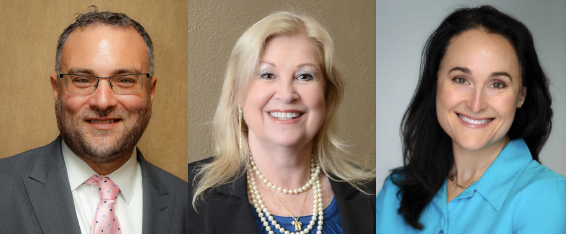In a historic move for Conservative Judaism in Kansas City, Congregation Beth Shalom and Congregation Ohev Sholom officially merged on July 1.
The two congregations held votes on June 26 after the negotiating committees of the Joint Task Force between them reached an agreement for consolidation.
The merged congregation will retain the name Congregation Beth Shalom and be housed in the Beth Shalom building at 14200 Lamar Avenue in Overland Park. The first Shabbat service for the combined congregations was held on July 2.
At the congregational vote for Beth Shalom (which coincided with its annual meeting and installation of new board members), Joint Task Force member Harold Kaseff presented the motion for Beth Shalom congregants to approve the merger of the two congregations. The motion was seconded by multiple people, and there was no opposition.
A similar meeting for Ohev Sholom members was held virtually on the same night as Beth Shalom’s, and they also voted for the merger. The congregation recently sold its building at 5311 W. 75th Street in Prairie Village.
In an announcement sent to The Chronicle, leaders of both congregations expressed their support and optimism for the consolidation process and the future of the merged congregation.
Mike Silverman, president of Ohev Sholom, said, “The consolidation was supported by the leadership of both congregations, who believe that the Greater Kansas City Jewish community will benefit from a combined Conservative congregation that is able to provide a wide range of services and programs to its members and the community.”
Jason Krakow, outgoing president of Beth Shalom, said, “This was a forward-looking and courageous decision. Beth Shalom is honored to join together with Ohev Sholom to create a stronger future together.”
Dr. Ann Karty, who was installed as Beth Shalom’s new president on June 26, said, “Over the summer, the exciting benefits of the consolidation will begin to take shape as our staff and clergy are already beginning their work together.”
“The consolidation was carefully planned to create a comfortable and welcoming congregation by a Joint Task Force made up of members from each synagogue,” according to the announcement. Harold Kaseff, Mike Silverman, Audrey Asher, Jeff Katz, Joel Levine, and Debbie Sosland-Edelman were given credit for working for about a year to consolidate the congregations.
The agreement, made available to both congregations before the vote, included detailed information about the merger and what is to come from it.
The “new” Beth Shalom
Rabbi David Glickman will remain Senior Rabbi of the combined Beth Shalom, and Hazzan Tahl Ben-Yehuda will continue as hazzan. Rabbi Beryl Padorr, rabbi of Ohev Sholom, will serve as Associate Rabbi for the consolidated congregation. Stefanie Williams will continue as executive director, and Ohev Sholom’s Steve Berman will be assistant executive director.
Both congregations’ prayer books will continue to be used. The agreement mentions that there may be new melodies for the Aleinu prayer. Aliyahs will be limited to two persons each.
The new board of directors will “be populated with a proportionate number of seats based upon the actual number of Beth Shalom and Ohev Sholom (pre-merger) full member units,” according to the agreement. The two Sisterhoods also will be consolidated.
Physical items from the two synagogues will be displayed equally in the building, including Yahrzeit plaques and confirmation photos. The current Beth Shalom library will become a “respectful and dignified” Ohev Sholom Memorabilia Room, according to the agreement.
Former Ohev Sholom members will pay dues to the merged Beth Shalom in the same amount as they were paying to Ohev Sholom prior to the merger, and will pay the same amount for security charges (unless security charges for the consolidated congregation increase by more than 8%), for ten years after the merger. Former Ohev Sholom members also will not need to pay any due increases or United Synagogue of Conservative Judaism fees for 10 years.

Courtyard, sukkah, and northern location
The consolidated congregations will build a “substantial and well-designed” sukkah and courtyard. It will be adjacent to Beth Shalom’s upcoming new sanctuary and will be called the Congregation Ohev Sholom Sukkah and Courtyard.
A second location for additional monthly musical Shabbat services will be established north of 79th Street (on either the Kansas or Missouri side). Until the second, northern location is finalized, the additional services will be conducted at Asbury United Methodist Church, 5400 W. 75th Street in Prairie Village.
“It is also anticipated that this [northern] location will be used to expand the availability of Jewish religious, educational, social, and other experiences for current members and the general Jewish community,” according to the agreement. A joint committee will help with location planning and usage.
A “frequently asked questions” document about the merger states that the consolidated congregation’s leadership will “evaluate the opportunities to offer programming in a northern location. This was a Beth Shalom priority when we committed to building the sanctuary at 14200 and Lamar, and this gives us more critical mass to do so.”
History
Both Conservative synagogues have deep roots in the community. Beth Shalom was established in 1915 and has a history dating back to 1878. Ohev Sholom was the oldest operating Jewish congregation in Kansas and can trace its origins to 1877. Beth Shalom Immediate Past President Jason Krakow (then president) described the merger of these two historic congregations as “an emotional event” in a Beth Shalom email update prior to the congregational votes.
The two congregations had discussed mergers in 2009, but no resolution was agreed upon. Despite this, both have been joining together for morning minyans for several years, and past Ohev Sholom Rabbi Scott White told The Chronicle in July 2021 that there is “virtually no distinction in terms of religious philosophy” between the two congregations.



